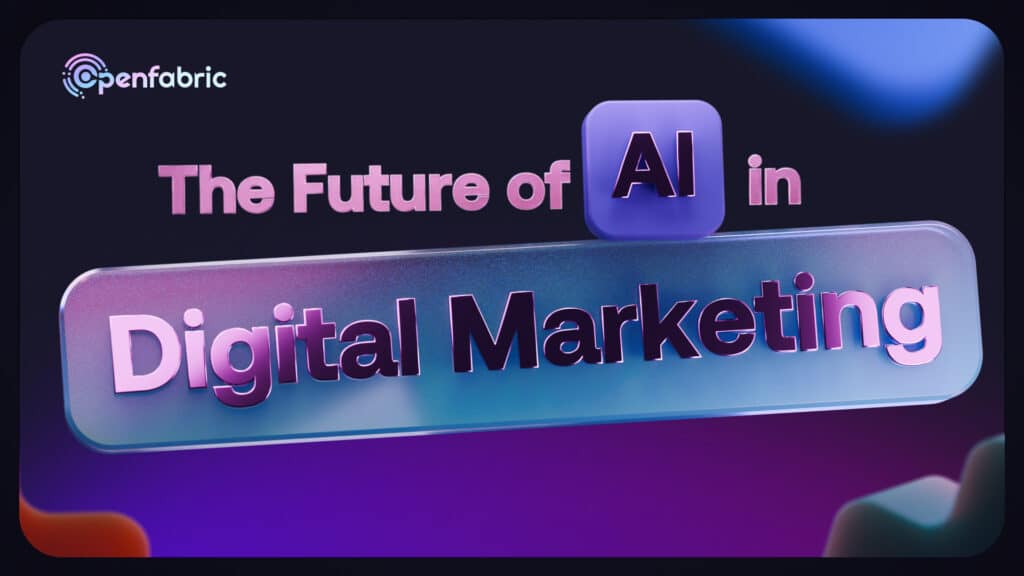
June 14, 2024 7 minutes read
The Future of AI in Digital Marketing

Digital marketing itself is almost as old as the internet. At the earliest stages of digital marketing, it basically revolved around static websites and online advertising. However, in the late 90s and early 2000s as the internet further advanced, brand’s and businesses began to see the power of the internet for digital marketing. This set the foundation for the coming of AI in digital marketing.
The internet, becoming a new frontier, got businesses curious and seeking new ways to interact with their audience. This is where marketing techniques such as banner ads and email marketing started. Although, these techniques and tools used were rudimentary compared to what we have now they were effective as at the time.
Another point of evolution in digital marketing came with the advent of social media. Social media literally changed the whole scene. This is because it allowed businesses to interact on a more personal level with their audience. For audiences, this method of digital marketing ensured trust and easy communication between them and the business. Read more about the advent of social media in internet marketing on Wikipedia.
Digital marketing advanced further when digital marketing tools were developed. These tools allowed marketing professionals to analyze the results of their marketing efforts. So, with the results gotten from this analysis, they can further improve their strategies.
Limitations of Early Digital Marketing
While these advancements were functional at the time, early digital marketing was a largely manual and time consuming process. This was because of the following reasons:
- Marketers had to rely solely on their intuition and experience to make decisions.
- They lacked the benefit of real-time data or sophisticated algorithms.
- In addition, campaigns were planned and executed over weeks or months.
- The ability to quickly adapt to changing market conditions was limited.
All these limitations made effective digital marketing a strenuous and time consuming process. They say, “time is money”. Therefore, marketers could not generate as much income as they should.
Current Involvement of AI in Digital Marketing
Today, artificial intelligence (AI) is changing digital marketing in a lot of ways. A lot of these ways were unimaginable just a few years ago. Currently, AI technologies are integral to many aspects of digital marketing.
Let’s take a look at some of the aspects in the involvement of AI in digital marketing.
Content creation
Creating content for digital marketing is changing because of AI-powered tools. Nowadays, we have Natural Language Processing (NLP) algorithms that can generate high-quality content based on specific inputs. This helps to save the marketers time and effort.
These tools can write articles, create social media posts, and even produce video content. For example, platforms like Openfabric AI can help generate animation videos and 3-D models for content. Try these applications on our Explorer.
Moreover, AI analyzes huge amounts of data to identify relevant content that resonates with a target audience. This saves you a lot of effort because the content you share is always timely and engaging.
Use of Chatbots for customer service
The use of AI-powered chatbots is gradually increasing in digital marketing. Consumers use them to provide instant customer support and improve user experience.
What do these chatbots do?
These chatbots use machine learning algorithms to understand and respond to customer inquiries in real-time. They can also handle a wide range of tasks, like answering frequently asked questions and assisting with product recommendations and purchases.
Popular brands use chatbots on their websites and social media platforms to engage with customers. The advantage is that these chatbots are available 24/7. This ensures that customers receive prompt assistance regardless of the time of day.
Predictive analytics used for personalization
One of the most significant uses of AI in digital marketing is predictive analytics and personalization. AI-powered algorithms can analyze historical data to predict future trends, behaviors, and outcomes. This allows marketers to make data-driven decisions and optimize their strategies for better results.
In addition, predictive analytics can forecast customer behavior. This helps marketers to anticipate needs and preferences. For example, e-commerce platforms use AI to recommend products based on past purchases and browsing history. This is a great way to improve user experience and in turn get more sales.
Personalization goes hand in hand with predictive analytics. AI has been able to enable marketers to deliver highly personalized experiences to customers. It ensures that each interaction is relevant and engaging. This interaction could be through personalized email campaigns or tailored website content. This level of personalization improves customer satisfaction, increases conversion rates and customer loyalty.
Advertising and campaign optimization
Programmatic advertising platforms use AI to automate the buying and selling of ad space.
How do they do this?
They analyze user data and determine the best ad placements, then they target the right audiences. This makes sure that ads are shown to users who are most likely to engage with them. The brands in turn get a good return on investment (ROI).
Google and Facebook’s advertising platforms are examples of how AI in digital marketing is used to optimize ad campaigns. They use machine learning algorithms to analyze user behavior, adjust bids for ad space and target users real-time. This level of automation and optimization was totally unimaginable in the early days of digital marketing because of the limitations present.
Voice search and smart assistants
Voice search and smart assistants are gradually becoming the norm in our daily lives. With the increasing popularity of devices like Amazon Echo and Google Home, more users are turning to voice search to find information and make purchases. This shift has forced marketers to optimize their content for voice search by understanding the nuances of conversational queries.
AI-powered smart assistants like Siri, Alexa, and Google Assistant have changed how consumers interact with brands. They use natural language processing and machine learning to understand and respond to user queries.
The Future of AI in Digital Marketing with Openfabric AI
The future of AI in digital marketing is really promising. This is because it is filled with endless possibilities for innovation and growth. As AI technologies continue to advance, they will bring even more profound changes to the digital marketing landscape.
It is with this focus in mind that Openfabric AI has emerged. As a decentralized platform, we will provide creatives and marketers with the tools to take marketing to the next level.
Here are the ways Openfabric AI will change digital marketing.
Hyper-personalization
With the appropriate tools, marketers will be able to create highly individualized experiences for each customer. This level of personalization will extend beyond basic recommendations. It will also include personalized content, offers, and communication across all touchpoints.
With Openfabric AI, AI innovators can create tools that will analyze vast amounts of data from various sources. After analysis is complete, you can build comprehensive customer profiles. These profiles will enable marketers to create and deliver personalized experiences that resonate with each individual.
Enhanced customer experience
AI will play a crucial role in enhancing the overall customer experience. Chatbots and virtual assistants will become more advanced. They will be capable of understanding and responding to complex queries with greater accuracy. These AI-powered assistants will provide personalized customer support, improving satisfaction and loyalty.
Moreover, AI will enable more interactive and immersive experiences. With smarter virtual assistant technologies powered by Openfabric AI, customers can engage with products and brands in entirely new ways. For example, customers will be able to get accurate and detailed information about a product or service before making a purchase.
Automation and efficiency
Openfabric AI will continue to drive automation in digital marketing, streamlining various processes and increasing efficiency. This is because routine tasks such as content creation will be automated. By doing so, allowing marketers to focus on more strategic and creative aspects of their work.
Ethical and responsible AI
As the use of AI in digital marketing increases, there will be a greater emphasis on ethical and responsible AI practices. So, marketers will need to ensure that their AI algorithms are transparent, unbiased, and respect user privacy. This is where Openfabric AI comes in.
At Openfabric AI there are systems in place to ensure user protection protocols are functional. This is to protect user data and ensure the implementation of ethical guidelines in line with data protection systems regulations.
Digital Marketing Using the Internet of AI
In the future, AI in digital marketing will involve the integration of AI with other technologies. As the Internet of AI we have build a protocol that has already integrated these technologies. So, you as a marketer can generate vast amounts of data to gain deeper insights into consumer behavior.
Our blockchain technology can enhance data security and transparency in AI-driven marketing practices. This is because we prioritize user’s data privacy and rights.
The synergy between these technologies will unlock new possibilities for innovation and creativity. As such we will drive the next wave of digital marketing transformation.
Conclusion
The journey of digital marketing from its early stages to the present day has been marked by continuous innovation and transformation. However, the transformation process is still ongoing and Openfabric AI will play a pivotal role in this evolution. We will do this by revolutionizing various aspects of digital marketing and pave the way for a more data-driven and personalized approach.
At Openfabric AI, the future of AI in digital marketing is about creating meaningful and relevant experiences for customers. At the same time helping marketers to build stronger connections with their audiences, drive better results, and shape the future of digital marketing.
To read more about Openfabric AI, visit our Website.

